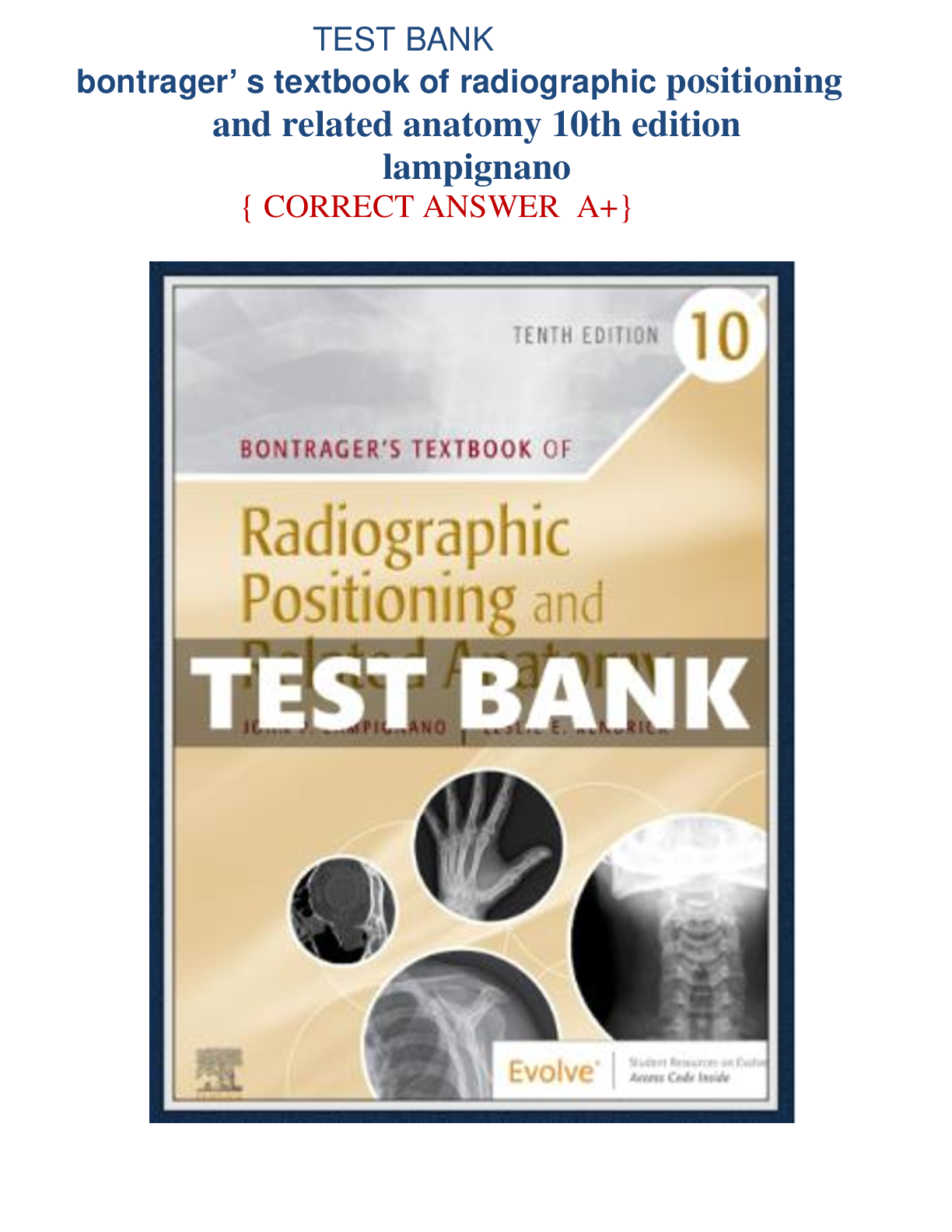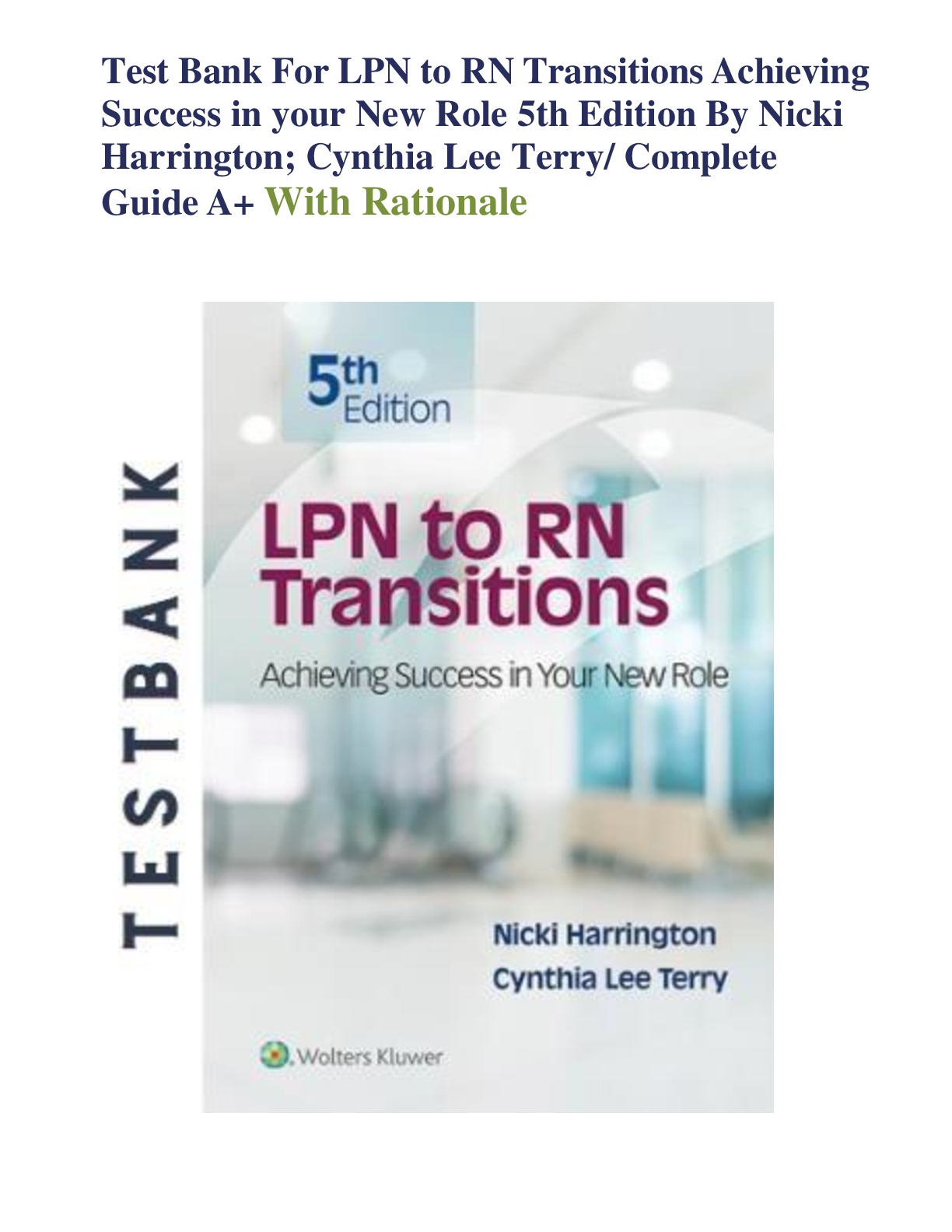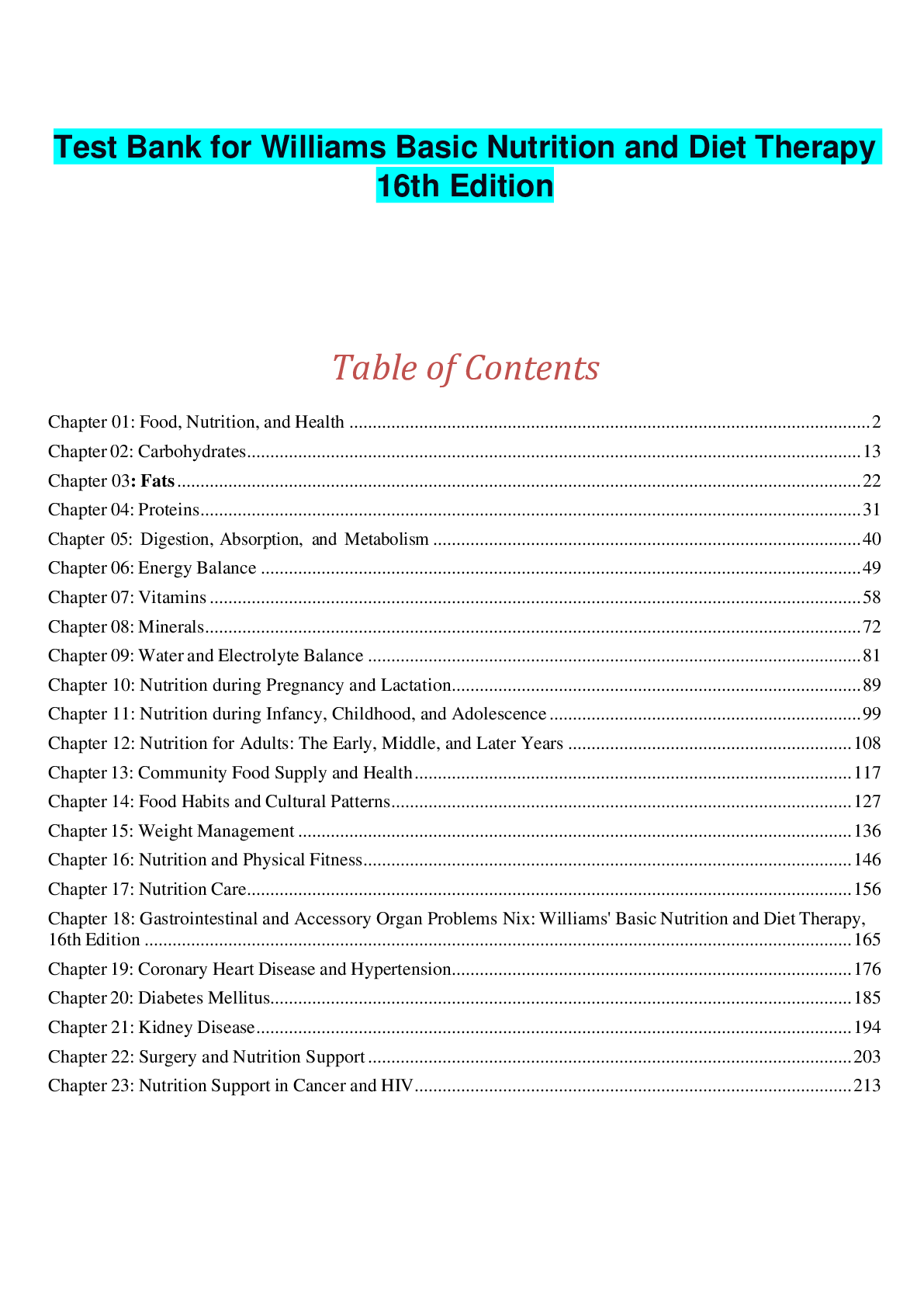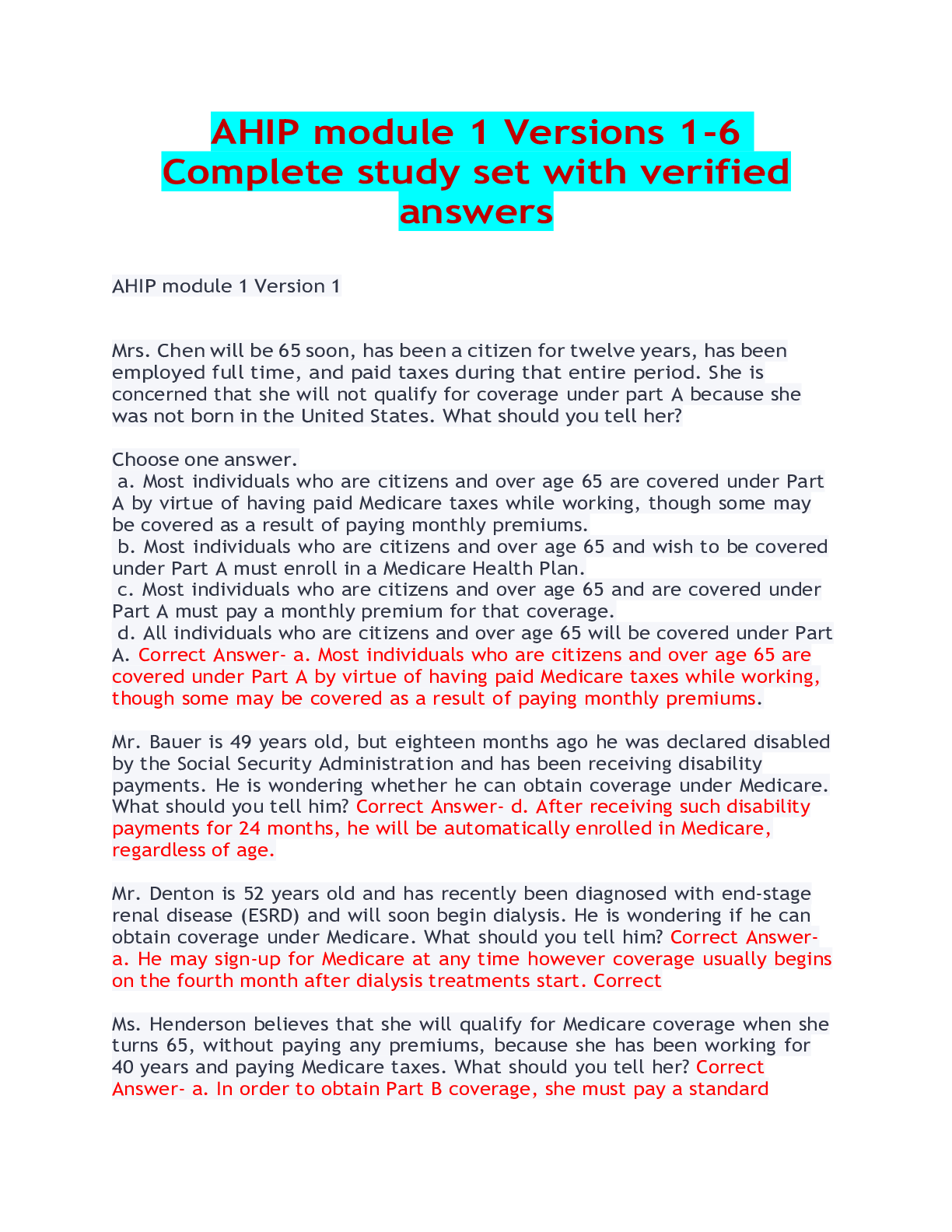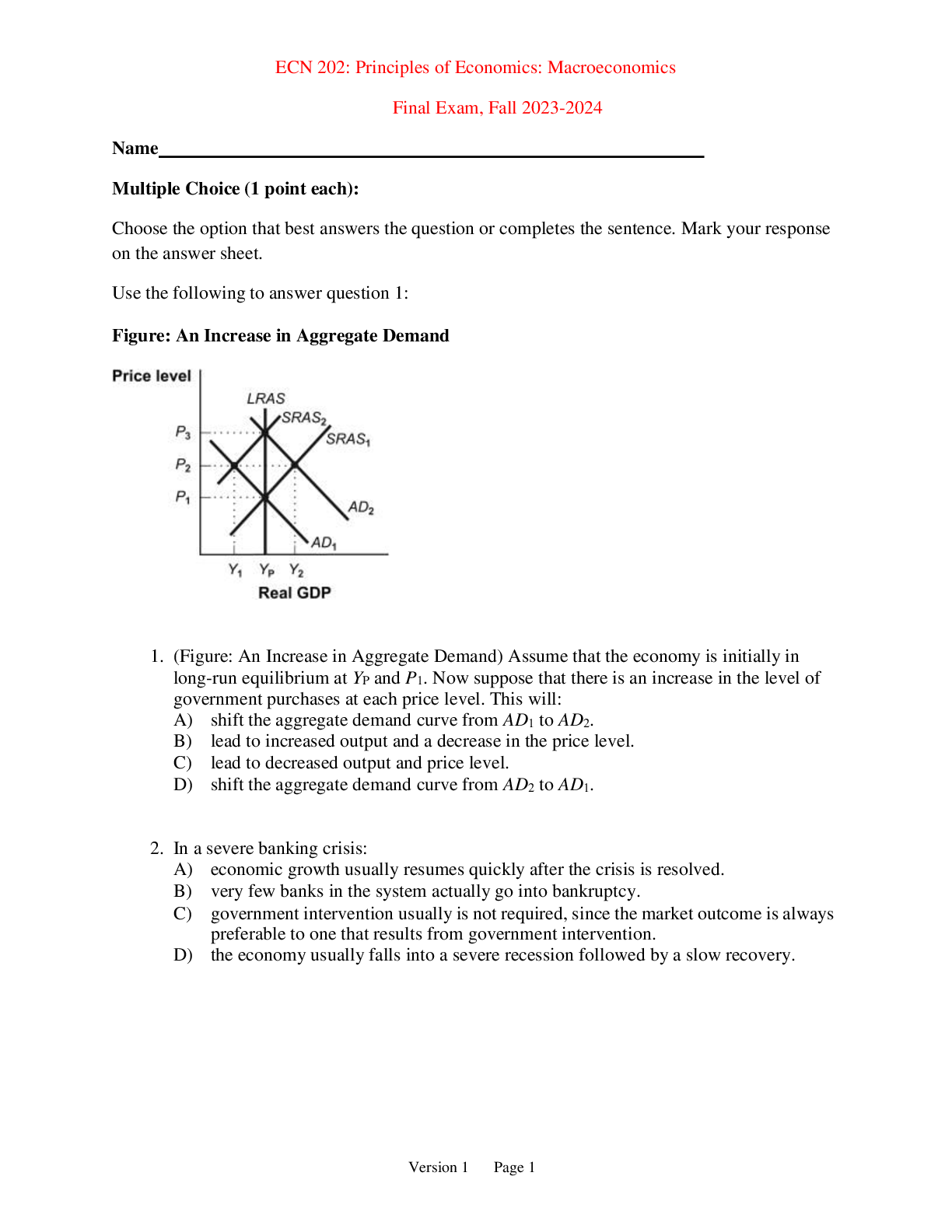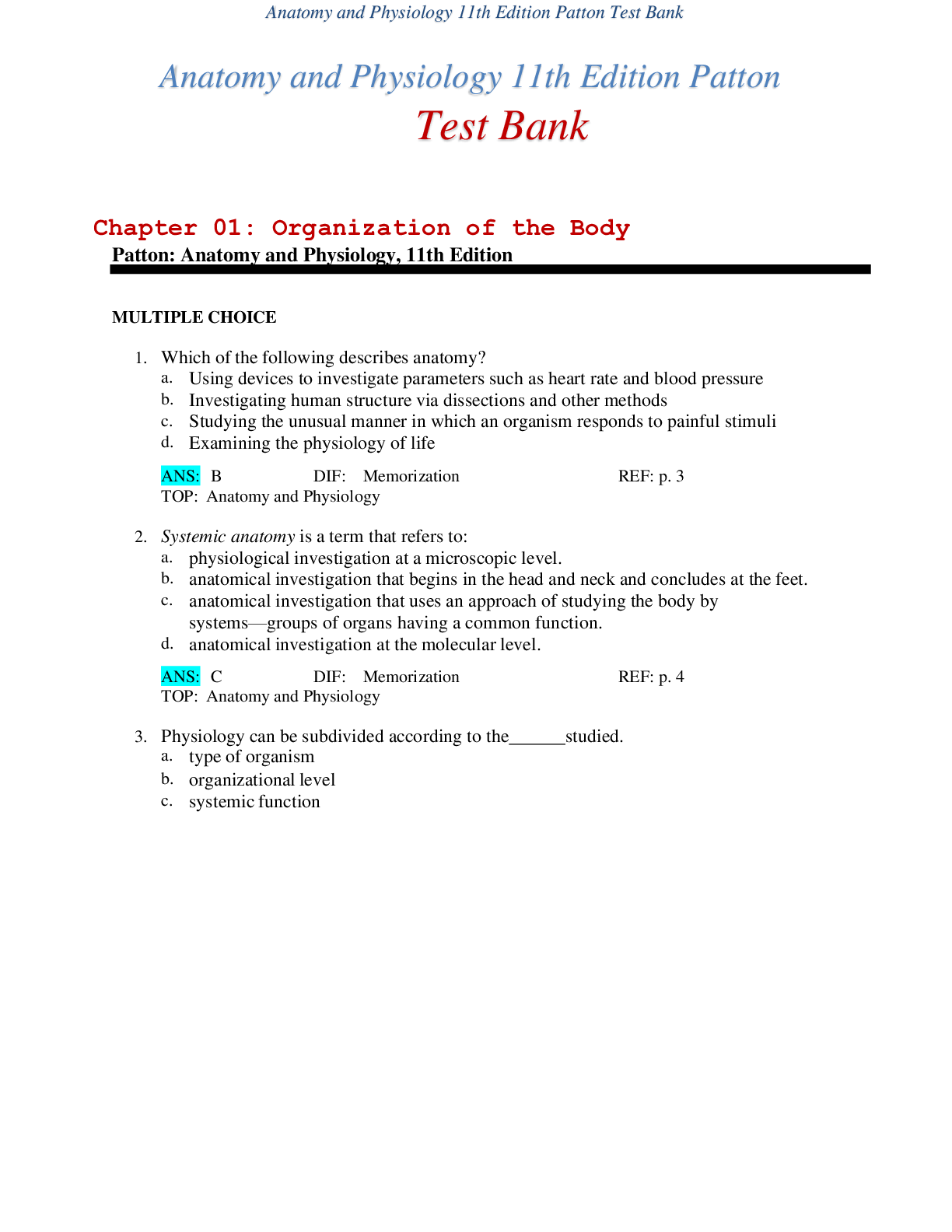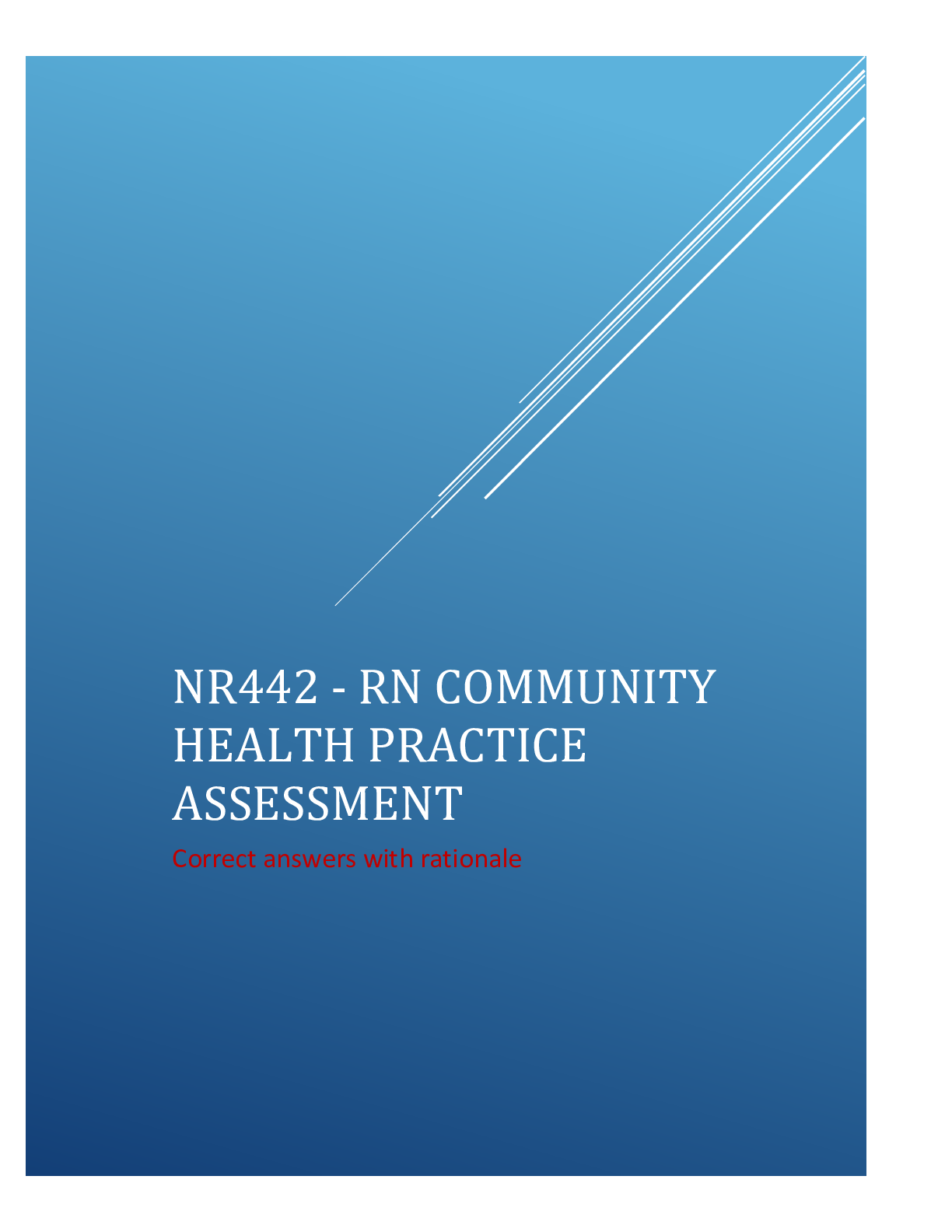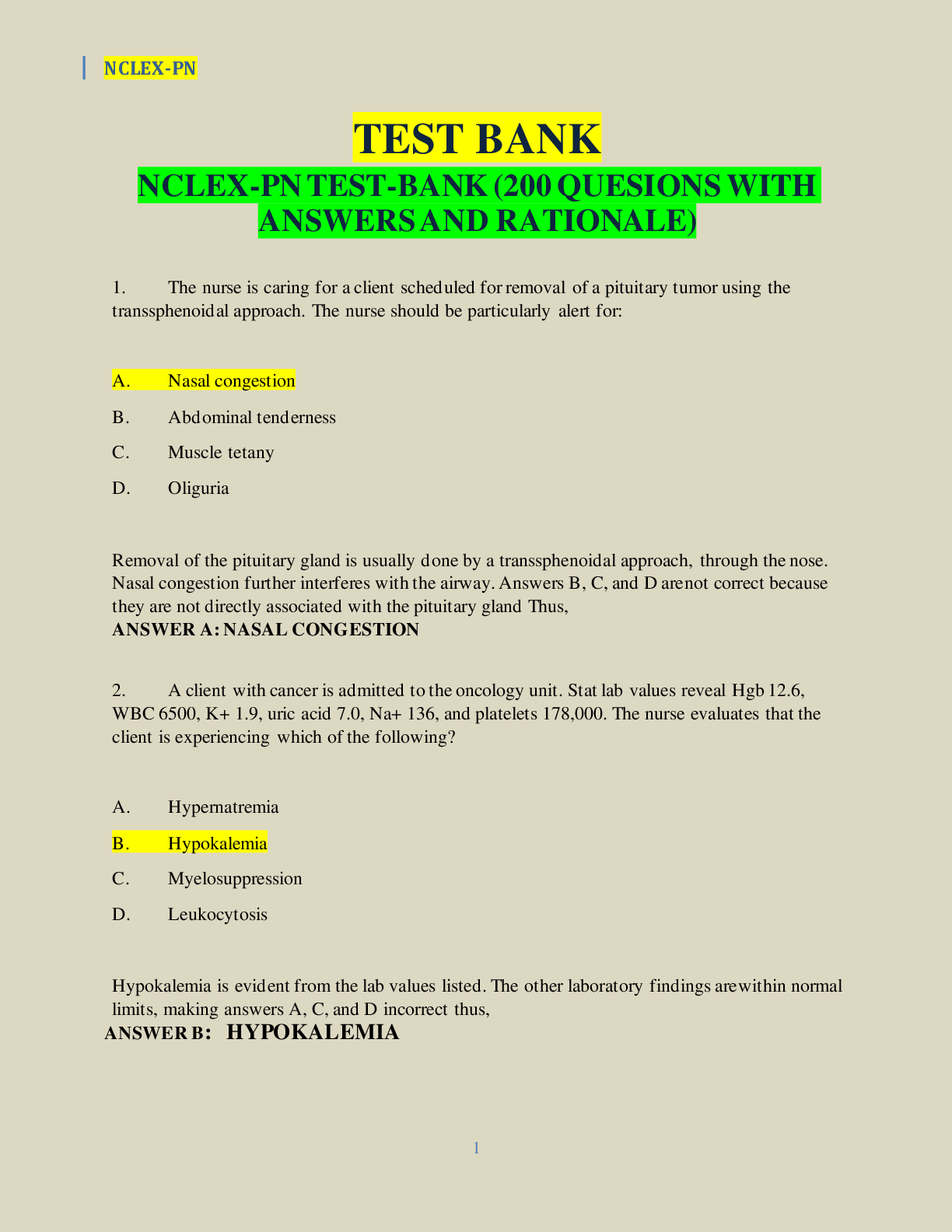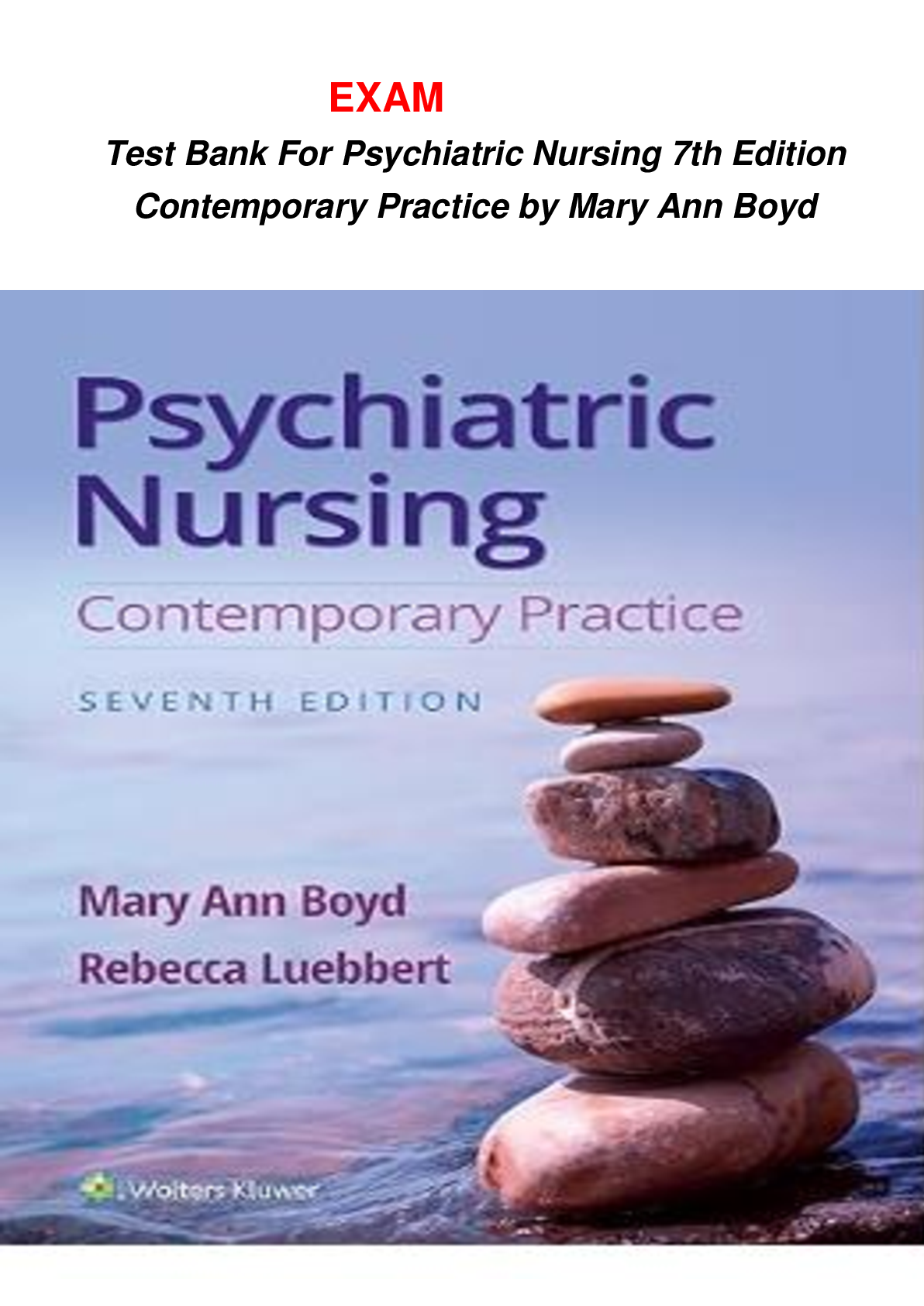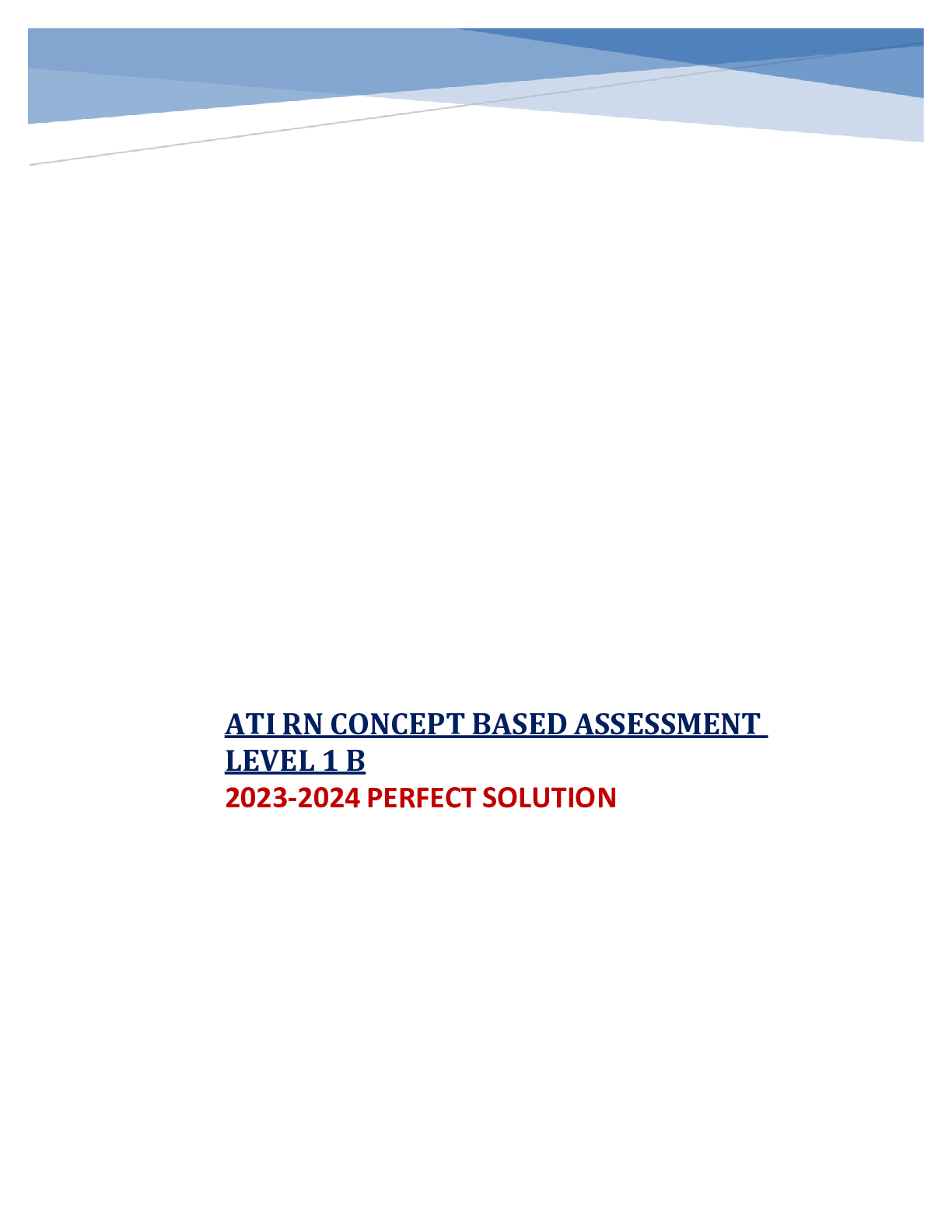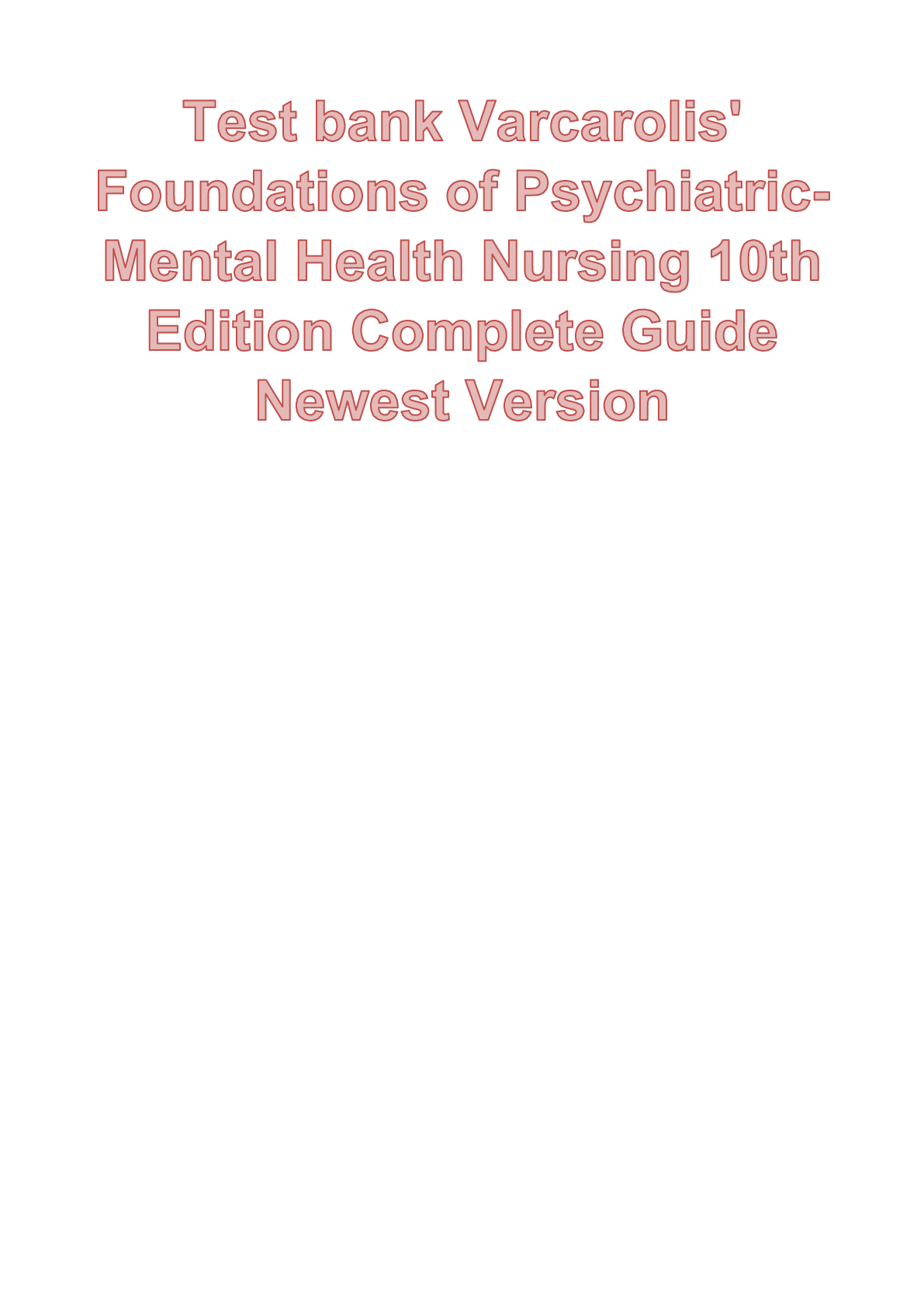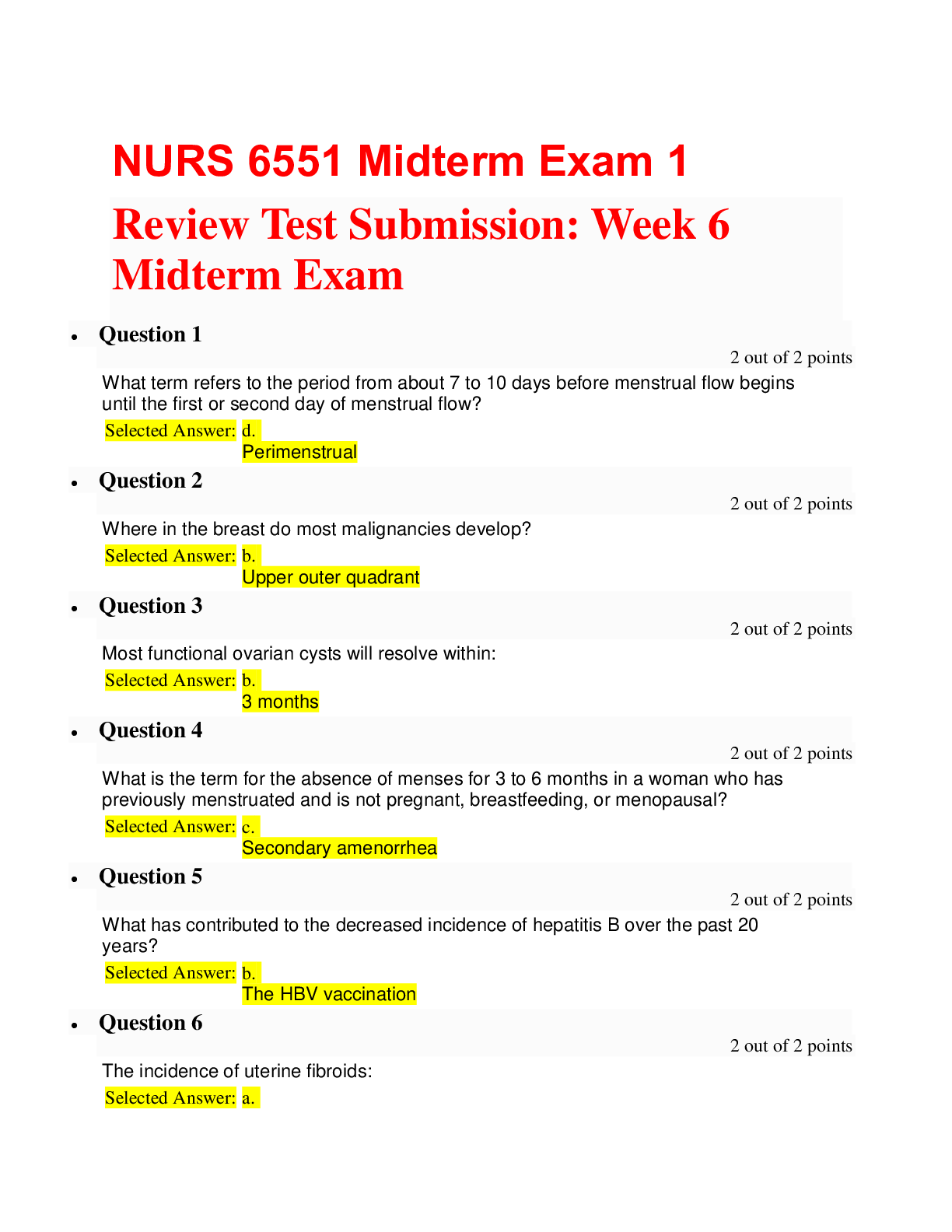Health Care > EXAM > NUR 256 Exam 1 Questions and Answer Solutions | 100% CORRECT | Galen College of Nursing| Assured A G (All)
NUR 256 Exam 1 Questions and Answer Solutions | 100% CORRECT | Galen College of Nursing| Assured A Grade
Document Content and Description Below
NUR 256 Exam 1 1.A nurse educator is presenting information about the nursing process to a class of nursing students. What definition of the nursing process should be included in the presentation ? 1.... Procedures used to implement client care 2. Sequence of steps used to meet the client’s needs 3. Activities employed to identify a client’s problem 4. Mechanisms applied to determine nursing goals for the client 2.A nurse on the medical-surgical unit tells other staff members, “That client can just wait for the lorazepam; I get so annoyed when people drink too much.” What does this nurse’s comment reflect? 1. Demonstration of a personal bias 2. Problem solving based on assessment 3. Development of client acuity to set priorities 4. Consideration of the complexity of client care 3.A teenager begins to cry when talking with the nurse about the problem of not being able to make friends. What is the most therapeutic nursing intervention? 1. Sitting quietly with the client 2. Telling the client that crying is not helpful 3. Suggesting that the client play a board game 4. Recommending how the client can change this situation 4.After being medicated for anxiety, a client says to a nurse, “I guess you are too busy to stay with me.” How should the nurse respond? 1. “I’m so sorry, but I have to see other clients” 2. “I have to go now, but I will come back in 10 minutes” 3. “You’ll be able to rest after the medicine starts working” 4. “You’ll feel better after I’ve made you more comfortable” 5.A physician is admitted to the psychiatric unit of a community hospital. The client, who was restless, loud, aggressive, and resistive during the admission procedure, states, “I will take my own blood pressure.” What is the nurse’s most therapeutic response? 1. “Right now you are just another client” 2. “If you would rather, I’m sure you will do it correctly” 3. “I will get the attendants to assist me if you do not cooperate” 4. “I am sorry, but I cannot allow that because I must take your blood pressure” 6. What is the most important tool a nurse brings to the therapeutic nurse-client relationship? 1. Oneself and a desire to help 2. Knowledge of psychopathology 3. Advanced communication skills 4. Years of experience in psychiatric nursing 7.A daughter of a Chinese-speaking client approaches a nurse and asks multiple questions while maintaining direct eye contact. What culturally related concept does the daughter’s behavior reflect? 1. Prejudice 2. Stereotyping 3. Assimilation 4. Ethnocentrism 8. A nurse manager works on a unit in which the nursing staff members are uncomfortable taking care of clients from cultures that are different from their own. How should the nurse manager initially address this situation? 1. Assign articles about various cultures so that they can become more knowledgeable 2. Relocate the nurses to units in which they are not required to care for clients from a variety of cultures 3. Rotate the nurses’ assignments so they have an equal opportunity to care for clients from other cultures 4. Plan a workshop that offers opportunities to learn about the cultures they might encounter when at work 9. A 6-year-old child is diagnosed with type 1 diabetes. Considering the child’s cognitive developmental level, which explanation of the illness is most appropriate? 1. “Diabetes is caused by not having any insulin in your body” 2. “Diabetes will require you to take insulin shots for the rest of your life” 3. “You will be taught how to give yourself insulin now that you have diabetes” 4. “Taking insulin for your diabetes is like getting new batteries for your superhero toys” 10. “But you don’t understand” is a common statement associated with adolescents. What is the nurse’s best response when hearing this? 1. “I don’t understand what you mean” 2. “I do understand; I was a teenager once too” 3. “It would be helpful to understand; let’s talk” 4. “It’s you who should try to understand others” 11. After a therapy session with a health care provider in the mental health clinic, a client tells the nurse that the therapist is uncaring and impersonal. What is the nurse’s best response? 1. “Your therapist is really very good” 2. “I hope that the rest of the staff is caring” 3. “The therapist is there to help you; try to cooperate” 4. “You have strong feelings about your therapy session and your therapist 15. A graduate nurse is preparing to apply to the State Board of Nursing for licensure to practice as a registered professional nurse. What group primarily is protected under the regulations of the practice of nursing? 1. The public 2. Practicing nurses 3. The employing agency 4. People with health problems 16. Which ethical principle means avoidance of harm? 1. Veracity 2. Autonomy 3. Beneficence 4. Nonmaleficence 17. A health care provider orders “Restraints prn” for a client who has a history of violent behavior. What is the nurse’s responsibility concerning this order? 1. Ask that the order indicate the type of restraint 2. Recognize that prn orders for restraints are unacceptable 3. Implement the restraint order when the client begins to act out 4. Ensure that the entire staff is aware of the order for the restraint 18. A client on the psychiatric unit is undergoing a pretreatment evaluation for electroconvulsive therapy (ECT). The nurse doubts that the client can provide an “informed consent” because of profoundly depressed behavior. What should be the nurse’s initial intervention? 1. Consult with the hospital’s legal staff and follow their recommendation 2. Have the client verbalize an understanding and outcomes of the procedure 3. Ask the client to sign the consent form because the client has not been declared incompetent 4. Suggest to the health care provider that a family member sign the consent form for the client 19. A pregnant client in the third trimester tells the nurse, “I want to be unconscious for the birth.” How should the nurse respond? 1. “You are worried about too much pain” 2. “You don’t want to be awake during the birth?” 3. “I can understand that because labor is uncomfortable” 4. “I will tell your health care provider about this request” 20. A client who retired a year ago tells the nurse in the community health center, “I don’t have any hobbies or interests, and since I retired, I feel useless and unneeded.” According to Erikson’s developmental theory, with which developmental conflict is the client faced? 1. Initiative versus guilt 2. Integrity versus despair 3. Intimacy versus isolation 4. Identity versus role confusion 23. A single, pregnant client who is attending a crisis intervention group has decided to go through with the pregnancy and keep the baby. What is the nurse’s primary responsibility at this time? 1. Confirm that this really is what the client wants to do 2. Explore other problems that the client may be experiencing 3. Select a health care provider that the client can visit for prenatal care 4. Provide information about resources from which the client may receive assistance 30. A nurse listens to a group of recent retirees. One says, “I volunteer with Meals on Wheels, coach teen sports, and do church visitation.” Another laughs and says, “I’m too busy taking care of myself to volunteer to help others.” Which psychosocial developmental task do these statements contrast? 1. Trust and mistrust 2.Intimacy and isolation 3.Industry and inferiority 4.Generativity and self-absorption 31. When the community health nurse visits a patient at home, the patient states, “I haven’t slept the last couple of nights.” Which response by the nurse illustrates a therapeutic communication response to this patient? 1. “I see.” 2. “Really?” 3. “You’re having difficulty sleeping?” 4. “Sometimes, I have trouble sleeping too.” 34. On review of the patient’s record, the nurse notes the admission was voluntary. Based on this information, the nurse anticipates which patient behavior? 1. Fearfulness regarding treatment measures. 2. Anger and aggressiveness directed toward others. 3. An understanding of the pathology and symptoms of the diagnosis. 4. A willingness to participate in the planning of the care and treatment plan. 35. The nurse employed in a mental health clinic is greeted by a neighbor in a local grocery store. The neighbors ask the nurse, “How is Mary doing? She is my best friend and is seen at your clinic every week.” Which is the MOST APPROPRIATE nursing response? 1. “I can not discuss any patient situation with you.” 2. “If you want to know about Mary, you need t ask her yourself.” 3. “Only because you’re worried about a friend, I’ll tell you that she is improving.” 4. “Being her friend, you know she is having a difficult time and deserves her privacy.” 36. Which statement demonstrates the BEST understanding of the nurse’s role regarding ensuring that each client’s rights are respected? 1. “Autonomy is the fundamental right of each and every client.” 2. “A patient’s rights are guaranteed by both state and federal laws.” 3. “Being respectful and concerned will ensure that I’m attentive to my patient’s rights.” 4. “Regardless of the patient’s conditions, all nurses have the duty to respect patient rights.” [Show More]
Last updated: 1 year ago
Preview 1 out of 6 pages
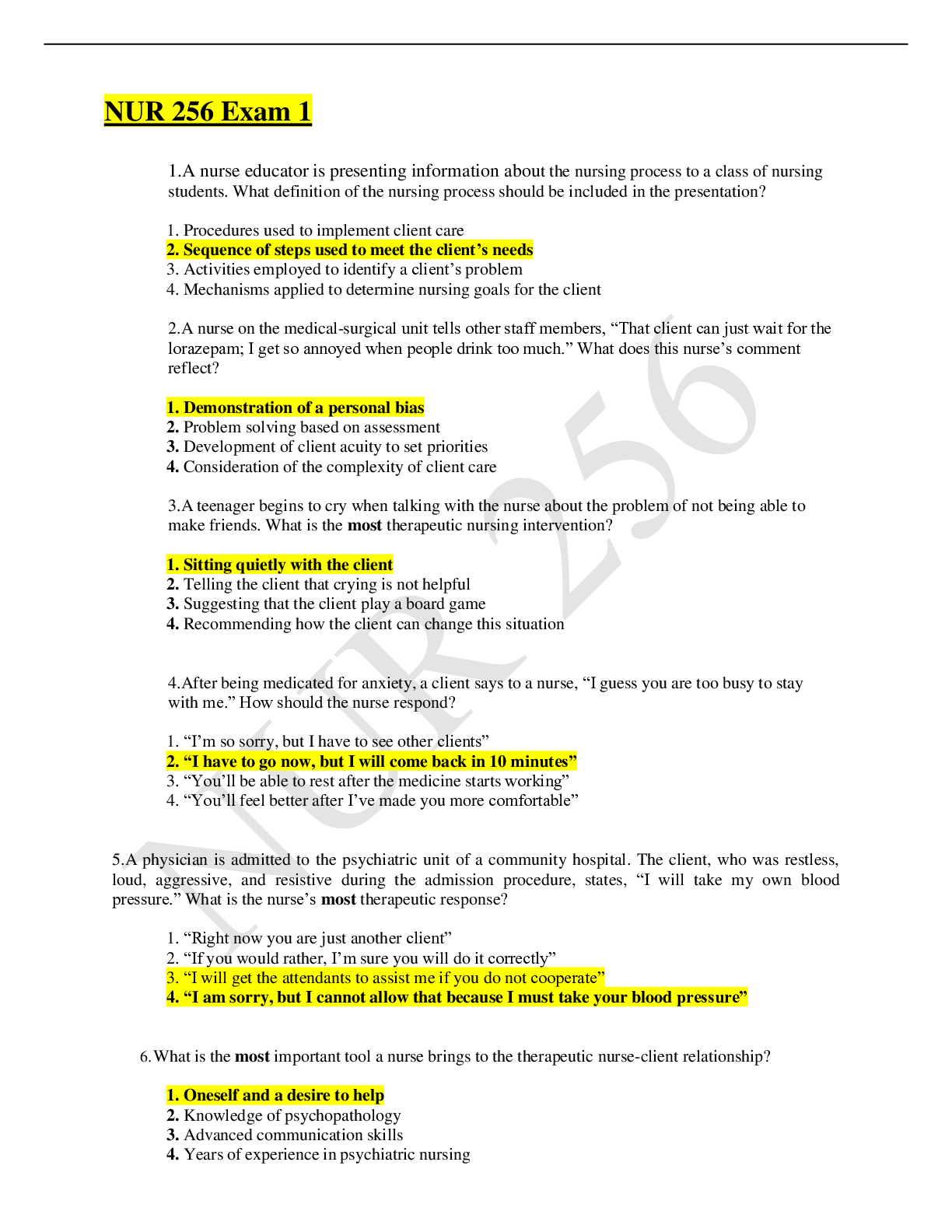
Buy this document to get the full access instantly
Instant Download Access after purchase
Buy NowInstant download
We Accept:

Reviews( 0 )
$8.00
Can't find what you want? Try our AI powered Search
Document information
Connected school, study & course
About the document
Uploaded On
Sep 04, 2023
Number of pages
6
Written in
Additional information
This document has been written for:
Uploaded
Sep 04, 2023
Downloads
0
Views
23

